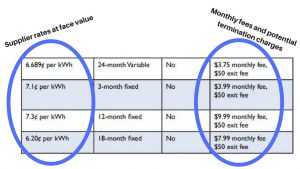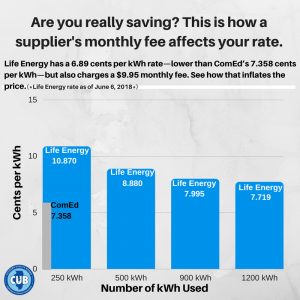Consumers sometimes enroll with alternative suppliers because the rates appear lower than the regulated utility, but be careful that such plans could have an additional monthly fee.

Beware: A monthly fee can inflate a seemingly lower rate. This is an excerpt from CUB’s fact sheet. Click on the image to visit the full publication.
Every week, I update fact sheets listing alternative supplier prices, compared with the the rates of regulated utilities. By my count, about a dozen companies slap customers with monthly fees in Illinois’ electric and gas markets.
For example, as of early June, Life Energy was charging 6.89 cents per killowatt-hour (kWh) PLUS a $9.95 monthly fee.
The per-kWh rate compares well with ComEd’s rate of 7.358 cents per kWh–but when you factor in the monthly fee, Life Energy’s rate is actually 7.995 cents per kWh! Here’s the math for a Life Energy customer who used 900 kWh in a month:
1) Number of kWh used multiplied by the per kWh rate.
900 kWh X 6.89 cents/kWh = $62.01
2) Add the monthly fee.
$62.01 + $9.95 = $71.96
3) Take the total and divide it by the number of kWh used.
$71.96/900 kWh = 7.995 cents per kWh
That compares to 7.358 cents with ComEd, for total supply costs of $66.22. You lose nearly $6 with Life Energy, and that adds up over a year!
So if you’re pitched a rate that seems significantly lower than the utility, remember there could be a monthly fee attached to the offer.
But don’t the utilities charge a monthly fee? It’s the “customer charge,” and it’s on the delivery side of bills, which means we all pay it whether we’re with the utility or a supplier. The bottom line: ComEd’s customer charge won’t go away if you choose another supplier.
 You can browse CUB’s fact sheets for current alternative electric supplier rates for both ComEd and Ameren.
You can browse CUB’s fact sheets for current alternative electric supplier rates for both ComEd and Ameren.
You can also check out alternative gas supplier rates for Nicor and Peoples/North Shore Gas.

